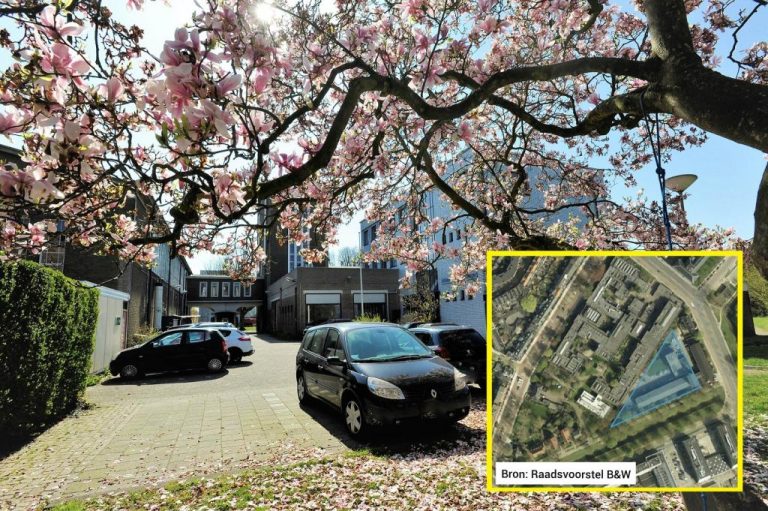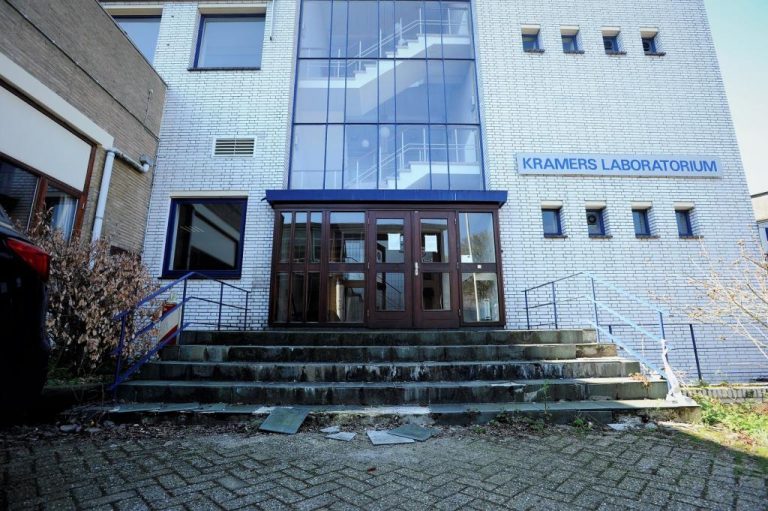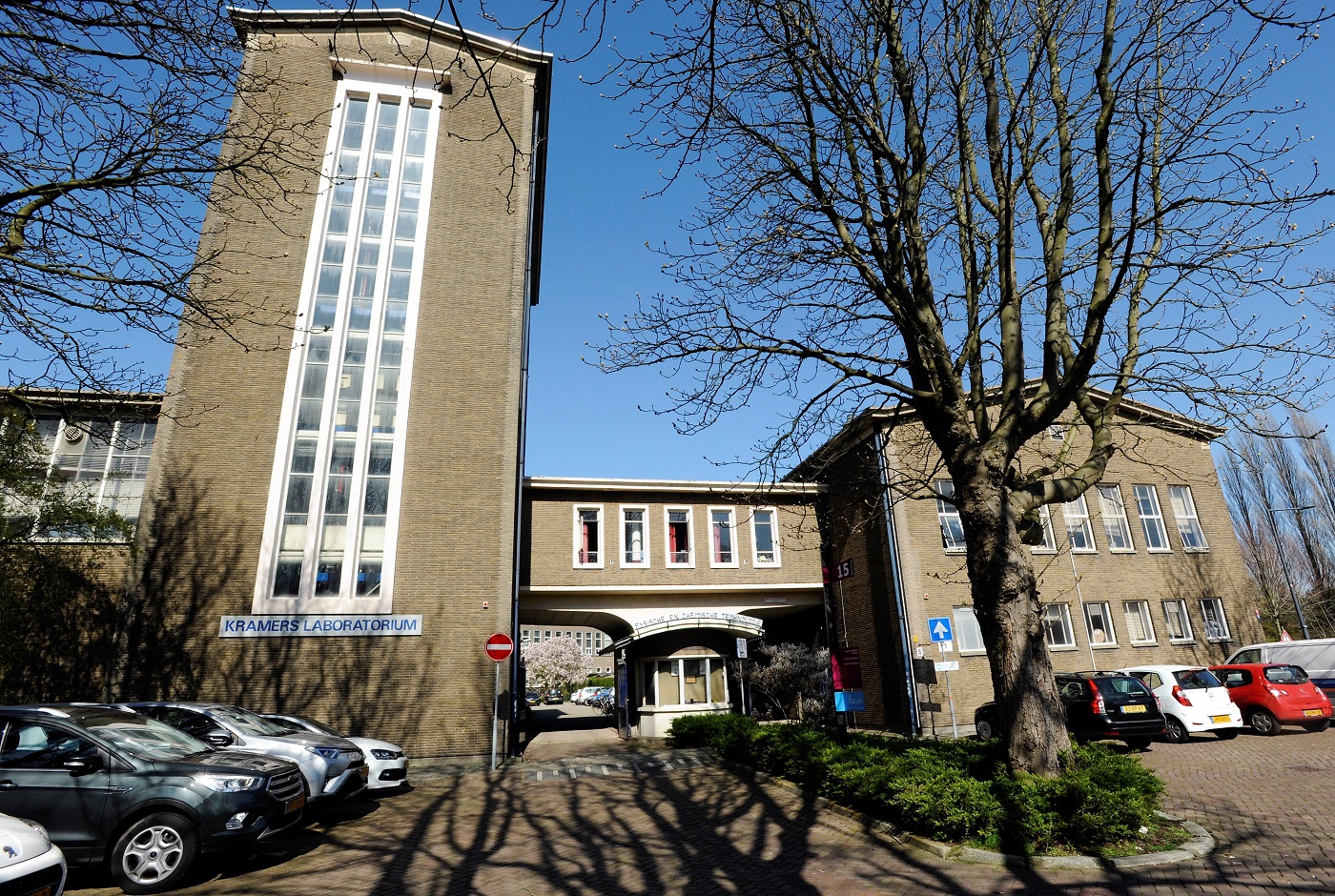The Municipality of Delft is prepared to buy part of the Gele Scheikunde complex from TU Delft with the aim of building an international secondary school.
The triangular plot with its gate and tower on the Gele Scheikunde complex. (Photo: Marjolein van der Veldt)
The Mayor and aldermen of Delft see a triangular plot of the Gele Scheikunde at 136 Julianalaan as the only option it has to build an international secondary school. Gele Scheikunde literally means ‘yellow chemistry’ and it derived its name from its previous yellow colour. The application for the school, submitted by the Stanislas College, was approved in January 2019 by the Minister of Education. The school will open on 1 August in a temporary building on the Colijnlaan.
The Municipality anticipates that the school will grow to up to 440 pupils in the next few years. Given its legal obligations, Delft must find a suitable and permanent building within three years. The Mayor and aldermen of Delft envision using the Gele Scheikunde plot for this purpose as in the zoning plan it is already allocated as an educational premises. Another advantage is that it is a stone’s throw from the international primary school on the Jaffalaan.
The Gele Scheikunde lies between the Prins Bernhardlaan, the Julianalaan and the Michiel de Ruyterweg. In a press release, the Municipality announced that a triangular piece of the land containing the Kramers Laboratory on the Prins Bernhardlaan was purchased for the symbolic amount of one euro.
The redevelopment costs are higher than the appraised value
The Municipality says that the price is based on the costs of demolition, asbestos removal and preparing the building ground for construction. If the land is to be used for social purposes, these costs are higher than the appraised value of the land. The Municipal Executive still needs to approve credit worth more than one-and-a-half million euros.

The triangular plot on the Gele Scheikunde complex. (Photo: Marjolein van der Veldt)
The Executive Board will still request the Works Council (OR) and the Student Council for advice. The OR’s Real Estate Working Group has only discussed the sale of the plot internally. “The duel between TU Delft and the Municipality is a delicate matter,” says the Working Group’s Chair, Paul Röling.
Röling asserts that the Municipality is ‘well able’ to put pressure on the remaining property. “If the Municipality says that it wants that piece of land, we lose our negotiation position. If TU Delft wants to sell the rest of Gele Scheikunde, it needs to obtain approval for a change in the zoning plan. We do want to sell the property, but if it can be sold to a commercial developer, we would get more money for it.”
Shared interests
A spokesperson from the Municipality says that as the property is zoned for social purposes, should a request be submitted for a change in the zoning, the Municipality must take on a public stakeholder role. “Furthermore, a point of consideration for the Municipality is Delft’s need for spaces for societal functions. That said, a change in the zoning plan is not linked to the plot that is now going to the Municipality,” says Jan Langstraat.
Langstraat points to the fact that the Municipality of Delft and TU Delft both have an interest in the international school locating in Delft. “It will help make Delft more attractive to live and work in. The international staff at TU Delft see the school as an important facility for their growing children. TU Delft also pushed this factor in a positive way.”
Three hundred homes
In the area development process, TU Delft and the Municipality consulted the neighbourhood and then drafted the ‘Ruimtelijk programmatisch kader’ (spatial framework). The document includes the interests of the different stakeholders such as a cap of 300 homes and a plinth on the Michiel de Ruyterweg with commercial facilities such as a hub for tech start-ups.
Further, apart from stating where and how high new builds may be, where the bicycle paths and parking facilities will be and so on, the document also states that the area must have plenty of high quality green. It also points to the cultural and historical elements of the complex. The tower, the gate and the two halls in the triangle are of significant cultural and historical value. The Kramers Laboratory – commonly called ‘De Witte Olifant’ (the white elephant) – is of less cultural and historical value. This does not automatically mean that these buildings must be retained as they are not protected historical monuments.
 The Witte Olifant which has fallen into disrepair. (Photo: Marjolein van der Veldt)
The Witte Olifant which has fallen into disrepair. (Photo: Marjolein van der Veldt)
Eelco de Vries, spokesperson for TU Delft, says that the framework is not a ‘serious planning document’. The new owner is free to opt for a different use of the space. “He will of course still have to go through all the planningprocedures,” says De Vries. The only occupants of the triangle now is the Hyperloop student team. The team’s rental contract comes to an end on 1 October and they will have to find a new space.
Do you have a question or comment about this article?
c.j.c.vanuffelen@tudelft.nl


Comments are closed.